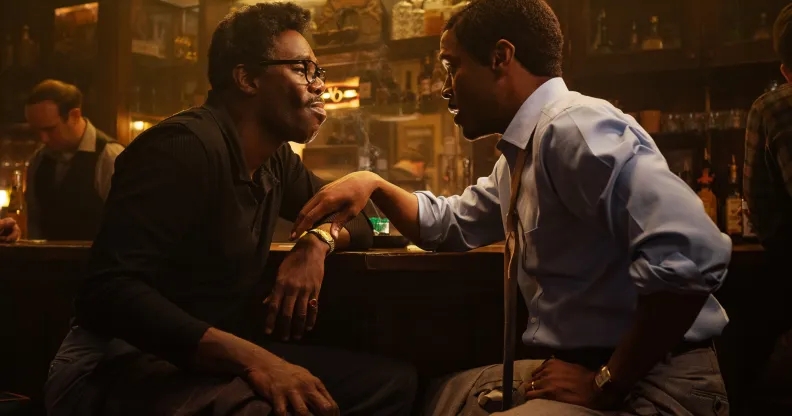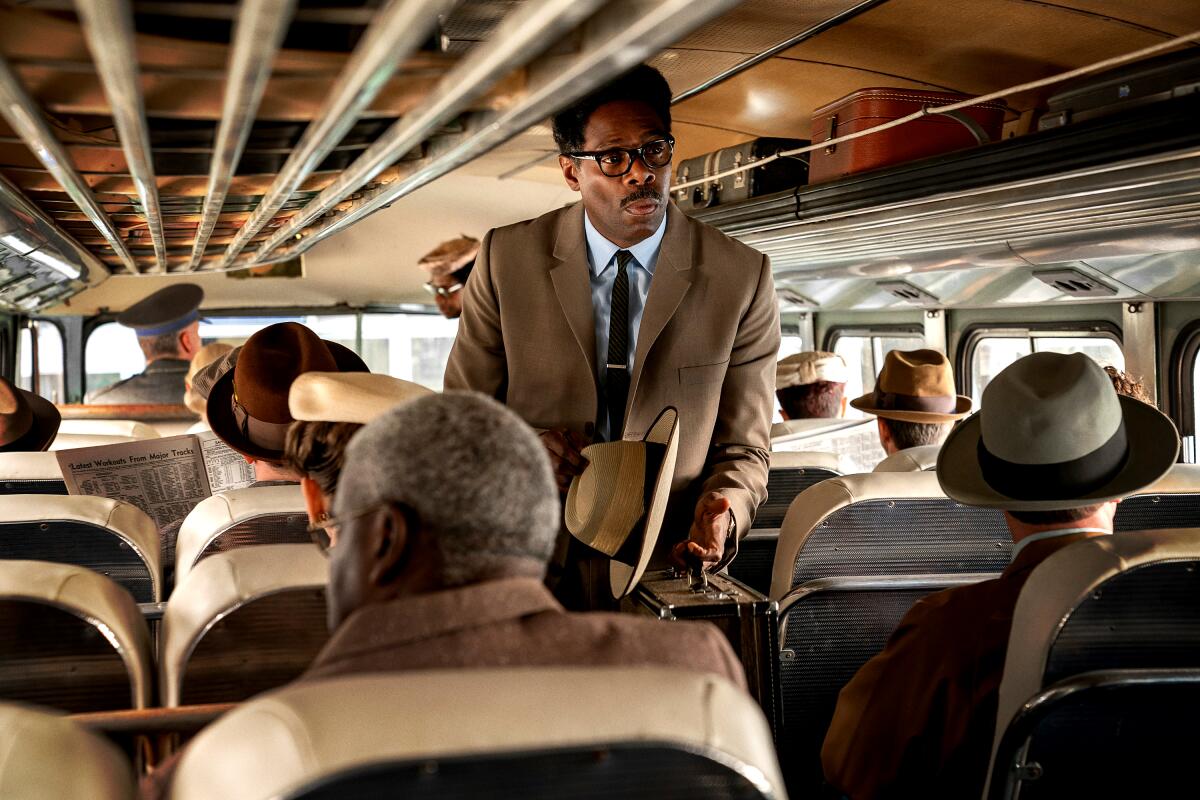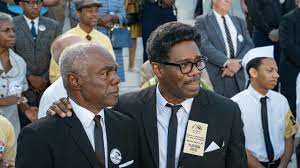





He was all but “erased” from the history of the famous 1963 “March on Washington for Jobs and Freedom” of 1963, where the Rev. Martin Luther King, Jr. took center stage as America’s greatest orator and the Conscience of the Nation, a march Bayard Rustin agitated for, planned and organized.
But that erasure didn’t take. A Black Civil Rights icon and gay man at a time when it was dangerous and even deadly to be either, Rustin’s memory was revived during the run up to the 50th anniversary of that August, 1963 protest on the National Mall. Documentaries celebrated him, and President Obama gave him a posthumous Presidential Medal of Freedom.
Now the Obamas’ production company has produced a terrific Netflix biopic, a star vehicle for a mesmerizing and righteously-animated Colman Domingo (“Fear the Walking Dead,” “Passing Strange”) and a piece of “forgotten” history brought vividly to life.
Theater and film director George C. Wolfe (“Ma Rainey’s Black Bottom”) and his cast and screenwriters bring a theatricality to the man, his famous Civil Rights contemporaries and the times, which play here as momentous — people making history, one of whom realized it more than others.
“Inspiration untethered from action loses all value!”
“Who said that?”
“I just did!”
“Rustin” begins with the activist’s efforts to lead a mass protest to the 1960 Democratic National Convention in in Los Angeles, which led to a break with the leadership of “The Movement” and a rift with longtime friend Dr. Martin Luther King, Jr. (Aml Ameen). It tracks Rustin through a couple of years in the wilderness, disdained for his “communist” and “pervert” (homosexuality) associations by white racists and general disapproval by NAACP chair Roy Wilkins (Chris Rock, summoning up as much gravitas as he can manage).
Allies like Ella Baker (Audra McDonald, regal) and union leader A. Philip Randolph (Glynn Turman, terrific) urge him back into the fold of a movement whose momentum, the film reminds us, often stalled in the decade after the momentous Brown v. Board of Education ruling by the Supreme Court.
The televised 1963 police assault on marchers in Birmingham, Alabama brings Rustin back to mend fences, and inspires Rustin to push for a mass march on Washington demanding government action. They’d organize, recruit and stage a march at the end of August while “the horror of Birmingham is still on the entire nation’s mind.”
Flashbacks tell us Rustin’s early awakening to a quest for justice, and the issue of his sexuality is addressed via a lover/assistant (Gus Halper) who helped publicize the march, and a closeted pastor (Johnny Ramey) Rustin cheated with. On the record, Wilkins objected to his “promiscuity” more than his sexual orientation.
Rustin faced resistance, demotion and “outing” at every turn, with threatened smears linking him to MLK and gay bar raids seemingly aimed at catching him in the act.
The story touches on the “accepted” homophobia of the white supremacist Senator Strom Thurmond and the Black New York Congressman and power broker Adam Clayton Powell, Jr. (Jeffrey Wright) and the ramptant sexism in America and even in The Movement.
Female Civil Rights leaders like Dr. Anna Hedgeman (CCH Pounder) were furious at their near total exclusion from the dais on the National Mall. That wasn’t really down to Rustin, who had his hands full with Black New York police officers to train as marchers practicing “passive resistance,” an uncooperative DC police chief and a National Park Service that declined to so much as meet with him for planning purposes.
Domingo catches fire in a performance given to speechifying, understandable given how quotable this man was as he drove “the cause of altering the trajectory of this country towards freedom.” Rustin’s connection to the women of The Movement is underscored when Domingo duets on “This Little Light of Mine” with Coretta Scott King (Carra Patterson) as he visits her and her children.
Turman, Pounder and McDonald are the best at holding their own with Domingo, with Michael Potts lighting up a smaller role, as the fiery and florid Jamaican-American labor organizer Cleveland Robinson.
Recreating the March itself with reenactors added to extant TV news coverage is impressive. Restaging Dr. King’s “I Have a Dream” speech is a mistake, as there’s no substitute for the real thing.
But in a story decorated with white “official” villains whom history has mostly (and rightly) forgotten, Jeffrey Wright is maybe one scene shy of stealing the movie as Powell, all arrogance, peacocking and lording his status over other Civil Rights leaders.
Wright and the script give Powell’s homophobia-as-excuse-for-grabbing-the-spotlight a venomous edge.
“Is this the man we want to see labeled ‘Mr. March on Washington?'”
Wright as Powell in “Rustin” might be the year’s best bad guy in a movie.
“Rustin” is quotable, brisk and inspiring, even if it feels less epic than it should. It has the budget, cast and scale of a good made-for-TV/streaming movie, not really “theatrical” in scope.
But if ever there was a chance its title character might once again be pushed out of the picture and removed from the story of a Red Letter Date in American history, Domingo, Wolfe, the Obamas and Netflix and their powerful movie have ensured that will never happen.
Rating: PG-13 violence, profanity, drug use
Cast: Colman Domingon, Glynn Turman, Chris Rock, Gus Halper, CCH Pounder, Aml Ameen, Audra McDonald, Michael Potts, Carra Patterson and Jeffrey Wright.
Credits: Directed by George C. Wolfe, scripted by Julian Breece and Dustin Lance Black. A Netflix release.
Running time: 1:46


